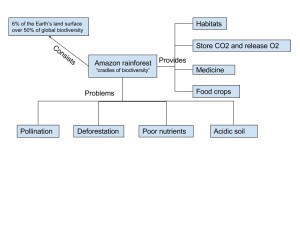- List two examples of biodiversity threats in your hometown.
- Use a system diagram to demonstrate the Amazon rainforest case study
- Why do you think biodiversity matters? For anthropocentric reasons or ecocentric reasons?
1.
My hometown Guangzhou is a populated urban city in China, and like many other urban cities in the world, it has relatively low biodiversity. Two leading threats to the biodiversity in Guangzhou would be pollution and human population. In Guangzhou, you rarely see fishes swimming in the water or birds flying in the sky, and I think it’s due to pollution. The rivers in Guangzhou were polluted and not well-treated until few years back, which was really unsuitable for aquatic life. As the water quality in improving now, it’s still hard to see any aquatic life in the water, but I think we would see some improvements in the near future. Increasing human population is another reason that’s threatening the biodiversity in Guangzhou. Guangzhou is an overpopulated city with a population of 14 million, so people are using up most of the available resources in the city. As a result, there won’t be enough resources like food and space for other species and it’s bad for local biodiversity.
2.
3.
Biodiversity is a measure of variation and richness of living organisms at a particular scale, and it is very important for every species on earth. Greater species diversity ensures natural sustainability for all life forms, and we won’t survive without it. For me, I value biodiversity mainly for anthropocentric reasons. Biodiversity can provide us scientific information, recreational benefits, medicine, food, or other materials that can be useful for our life, and we all depend on them. For example, a rich biodiversity not only provide us the food that keep us alive, but also varieties of other food. However, as the society developed, more people start to value biodiversity for its ecocentric reasons. Since we have enough knowledge to make good use of biodiversity, the unused value it provides also matters to us. Just like coral reef system, more people would like to learn about it and maintain it, even though they may not be benefited from it.


Hi Siyeng! My name is Tyler.
I never really though about biodiversity and cities together because, as you said, they don’t go together. Pollution and mass population would absolutley be a reason for the lack of other species to be inhabiting the area. That is really unfortunate. I usually think about the countryside or a forest.
Check out my blog! https://wp.me/p3RCAy-fhA
I found this post interesting as an article was chosen from the module discussing a biodiversity situation and commented on similar to mine. The diagram is also similar to mine as Amazon river was made the focus and their advantages and problems were shown, similar to the way I constructed my diagram. I found the last question interesting as it talks about the overall uses of biodiversity in general where as I talked about how biodiversity could be improved in the British Columbia in Canada as talked about in my article
Hello Siying,
My name’s Steven and here is a link to my post: https://wp.me/p3RCAy-fff
I really enjoyed the first part to your post. Although I have never visited Guangzhou directly, I have been near there in Hong Kong. The population there was extremely over packed in my opinion and the air the greatest either. I agree with your point on population and pollution being the two of the reasons for China’s lack of biodiversity, especially in the city areas.